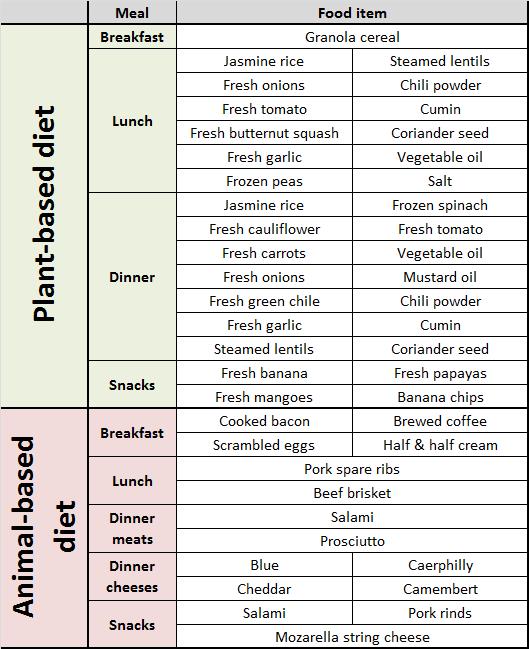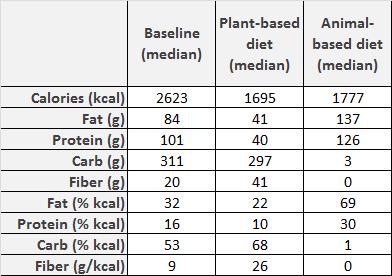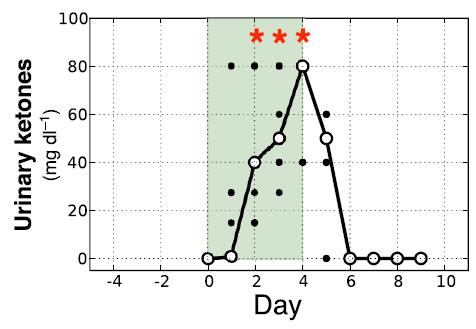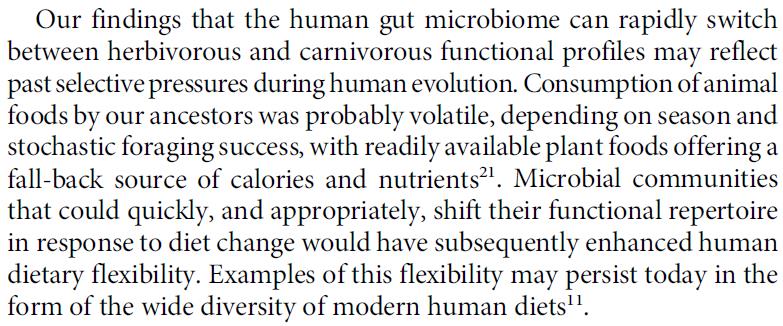Impact of a low-carbohydrate, high-fat diet on gut microbiota. | The poor, misunderstood calorie
NPR recently reported on a study where the participants ate either a meat-based, fiber-free ketogenic diet or a vegetarian diet and had their gut microflora analyzed. The low carbohydrate diet
or a vegetarian diet and had their gut microflora analyzed. The low carbohydrate diet
was much higher in fat, and as such, increased the prevalence of a
microbe involved in fat digestion. “Bilophilia.” The article focused on this one and
cited a 2012 study whereBilophilia was associated with intestinal inflammation
… however, the ketogenic diet increased the levels of Bacteroides and decreased
Firmicutes. These are the two that brought the whole gut
microbe-obesity connection into the spotlight. The microbiome in obese
mice is characterized by low Bacteriodetes and high Firmicutes. Fecal
transplants from obese mice to lean mice causes them to gain weight.
Little is known about Bilophilia relative to Bacteriodetes &
Firmicutes, and I suspect the focus was on Bilophilia because the
authors wanted something negative to say about a meat-based, fiber-free
ketogenic diet, and that 2012 mouse study suggested Bilophilia could be their answer.
Obesity alters gut microbial ecology (Ley et al., 2005)
Diet rapidly and reproducibly alters the human gut microbiome (David et al., 2013)

Calories and macro’s show that the animal-based diet was indeed, ketogenic:

And if you still think 126 grams of protein is too many for ketosis, ffs:
is too many for ketosis, ffs:
The diet only lasted 4 days; that’s not a disadvantage because
diet-induced microbial changes occur within 1-2 days and remain stable.

This study is interesting because it tested two widely
differing diets. Critics will say we can’t know what caused the changes
because there were too many variables. To them, I say this:
those studies will come; that doesn’t make this one useless or
uninteresting. Also, I don’t care much for Firmicutes or Bacteriodetes;
they’re obviously not the answer to obesity… the tone of the news
reports and article itself just didn’t sit well with me.
NPR recently reported on a study where the participants ate either a meat-based, fiber-free ketogenic diet
was much higher in fat, and as such, increased the prevalence of a
microbe involved in fat digestion. “Bilophilia.” The article focused on this one and
cited a 2012 study whereBilophilia was associated with intestinal inflammation
… however, the ketogenic diet increased the levels of Bacteroides and decreased
Firmicutes. These are the two that brought the whole gut
microbe-obesity connection into the spotlight. The microbiome in obese
mice is characterized by low Bacteriodetes and high Firmicutes. Fecal
transplants from obese mice to lean mice causes them to gain weight.
Little is known about Bilophilia relative to Bacteriodetes &
Firmicutes, and I suspect the focus was on Bilophilia because the
authors wanted something negative to say about a meat-based, fiber-free
ketogenic diet, and that 2012 mouse study suggested Bilophilia could be their answer.
Obesity alters gut microbial ecology (Ley et al., 2005)
This study shows increased Firmicutes & decreased Bacteriodetes inAn obesity-associated gut microbiome with increased capacity for energy harvest (Turnbaugh et al., 2006)
genetically obese mice but not their lean siblings. This is important
because microbes are usually inherited from Mom and are common among
littermates. Apparently, genetic obesity overrides both.
This one shows decreased Bacteriodetes & increased Firmicutes inHuman intestinal microbiota composition is associated with local and systemic inflammation in obesity (Verdam et al., 2013)
obesity. This is also the study that shows microbial transplantation
from obese to lean mice causes weight gain (with no change in food
intake). Oh yeah, and by “microbial transplantation,” they mean wiping
the poop of a fat mouse all over a skinny one. Yes, that’s how they do
it.
This study shows decreased Bacteriodetes & increased Firmicutes is associated with obesity and inflammation in humans.
Firmicutes associated with human obesity here, too. Sorry, everyone’s favorite Lactobacillus acidophilus is a Firmicute.Bifidobacteria, on the other hand, is not. #Bifidobacteria.
Diet rapidly and reproducibly alters the human gut microbiome (David et al., 2013)
The current study. The animal-based, high fat, very low carb,Dietary information was buried in the supplemental files, but great data presentation:
fiber-free ketogenic diet induced a microbial shift that correlates with
leanness in humans, and causes leanness in mice. This is what
should’ve made headlines, not Bilophilia.

Calories and macro’s show that the animal-based diet was indeed, ketogenic:

And if you still think 126 grams of protein

The diet only lasted 4 days; that’s not a disadvantage because
diet-induced microbial changes occur within 1-2 days and remain stable.

This study is interesting because it tested two widely
differing diets. Critics will say we can’t know what caused the changes
because there were too many variables. To them, I say this:
those studies will come; that doesn’t make this one useless or
uninteresting. Also, I don’t care much for Firmicutes or Bacteriodetes;
they’re obviously not the answer to obesity… the tone of the news
reports and article itself just didn’t sit well with me.